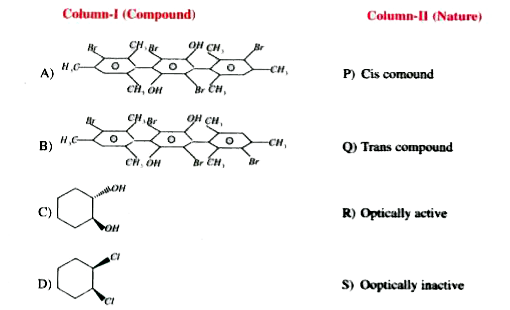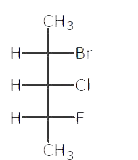The necessary condition for a molecule to exhibit optical isomerism is dissymmetry or chiral. Thus all organic compounds which contain one as symetric carbon atom are chiral and exist in two stereoisomers. Although the two forms have the same structure, they have different arrangements of groups about the as symmetric carbon. In fact, they represent as symetric molecules. They do not have a plane of symmetry. They are related to each other as an object to its mirror image and are non superimposable. The two structures actually stand for dextro or (+) and leavo or (-) isomers. Since they are related each other as mirror images, they are commonly called enantiomers.
Which of the following statements is correct regarding compounds I to III
 Solution in Telugu
Solution in Telugu
I is an achiral molecule
II contain three chiral centers
I and III are achiral molecules
III contains one chiral centre
The correct Answer is:C
I is an achiral molecule
Topper's Solved these Questions
- BOOK - AAKASH SERIESCHAPTER - ISOMERISM EXERCISE - PRACTICE SHEET EXERCISE-III (Stereo Isomerism) LEVEL-1I (ADVANCED) Matrix Matching Type Questions1videos
ISOMERISM
- BOOK - AAKASH SERIESCHAPTER - ISOMERISM EXERCISE - PRACTICE SHEET EXERCISE-III (Stereo Isomerism) LEVEL-1I (ADVANCED) Integer Type Questions4videos
ISOMERISM
- BOOK - AAKASH SERIESCHAPTER - ISOMERISM EXERCISE - PRACTICE SHEET EXERCISE-III (Stereo Isomerism) LEVEL-1I (ADVANCED) More than one correct answer Type Questions5videos
ISOMERISM
- BOOK - AAKASH SERIESCHAPTER - IONIC EQUILIBRIUM EXERCISE - ADDITIONAL PRACTICE EXERCISE (LEVEL -II PRACTICE SHEET (ADVANCED) (Integer Type Questions))8videos
IONIC EQUILIBRIUM
- BOOK - AAKASH SERIESCHAPTER - PERIODIC CLASSIFICATIONEXERCISE - OBJECTIVE EXERCISE - 3 (RECENT AIPMT/NEET QUESTIONS)14videos
PERIODIC CLASSIFICATION
Similar Questions
Match the following columns
 01:36View Solution
01:36View SolutionCH3−CH=CH−C∣OHH−C∣OHH−CH3 number of racemic mixtures possible for the above compound are
View SolutionWhich of the following is the diastereoisomer of
 05:24View Solution
05:24View SolutionA certain weak acid has Ka,=10−5. If the equilibrium constant for is its reaction with a strong base is repesented as y×10y then find the value of y.
06:06View SolutionWhich one of the following orders is not in accordance with the property stated against it?
View SolutionAssertion A molecule containing chiral carbon must be non-superimposable on its mirror image. ltbr> Reason A chiral carbon is bonded to four different atoms or groups.
03:23View SolutionA compound contain two dissimilar chiral carbon atoms. The number of optical isomes is/are
05:42View SolutionIf a molecule contains one carbon atom carrying four different groups it will not have a plane of symmetry and must therefore be chiral. A carbon atom carrying four different groups is a steregoenic or chiral centre. A structure with a plane of symmetry is achiral and superimposable on its mirror image and cannot exist as two enantiomer. A structure without a plane of symmetry is chiral and not superimposable on its mirror image and can exist as two enantiomer.

Number of enantiomeric pairs are01:53View SolutionIf a molecule contains one carbon atom carrying four different groups it will not have a plane of symmetry and must therefore be chiral. A carbon atom carrying four different groups is a steregoenic or chiral centre. A structure with a plane of symmetry is achiral and superimposable on its mirror image and cannot exist as two enantiomer. A structure without a plane of symmetry is chiral and not superimposable on its mirror image and can exist as two enantiomer. Relation between (a) & (b) is
05:23View SolutionIf a molecule contains one carbon atom carrying four different groups it will not have a plane of symmetry and must therefore be chiral. A carbon atom carrying four different groups is a steregoenic or chiral centre. A structure with a plane of symmetry is achiral and superimposable on its mirror image and cannot exist as two enantiomer. A structure without a plane of symmetry is chiral and not superimposable on its mirror image and can exist as two enantiomer.
Compound has both center of symmetry and P.O.S01:57View SolutionWhich of the following molecules does not have a chiral carbon atom?
04:03View SolutionAn example of a molecule which is chiral but does not contain chiral carbon atom is :
01:57View SolutionIn order that a compound may show geometrical isomerism A Compound must have a chiral carbon (B) Each of the two doubly bonded carbon atoms must have different atoms or groups (C ) Compound must have a plane of symmetry
02:36View SolutionThe necessary condition for a molecule to exhibit optical isomerism is dissymmetry or chiral. Thus all organic compounds which contain one assymetric carbon atom are chiral and exist in two stereoisomers. Although the two forms have the same structure, they have different arrangements of groups about the assymmetric carbon. In fact, they represent assymetric molecules. They do not have a plane of symmetry. They are related to each other as an object to its miror image and are non superimposable. The two structures actually stand for dextro or (+) and leavo or (-) isomers. Since they are related each other as mirror images, they are commonly called enantiomers. Consider the following structers A,B,C,D Which of the following statements is not correctConsider the following structers A,B,C,D Which of the following statements is not correct
02:49View SolutionThe necessary condition for a molecule to exhibit optical isomerism is dissymmetry or chiral. Thus all organic compounds which contain one assymetric carbon atom are chiral and exist in two stereoisomers. Although the two forms have the same structure, they have different arrangements of groups about the assymmetric carbon. In fact, they represent assymetric molecules. They do not have a plane of symmetry. They are related to each other as an object to its miror image and are non superimposable. The two structures actually stand for dextro or (+) and leavo or (-) isomers. Since they are related each other as mirror images, they are commonly called enantiomers. Which of the following compounds is optically inactive
View SolutionThe necessary condition for a molecule to exhibit optical isomerism is dissymmetry or chiral. Thus all organic compounds which contain one as symetric carbon atom are chiral and exist in two stereoisomers. Although the two forms have the same structure, they have different arrangements of groups about the as symmetric carbon. In fact, they represent as symetric molecules. They do not have a plane of symmetry. They are related to each other as an object to its mirror image and are non superimposable. The two structures actually stand for dextro or (+) and leavo or (-) isomers. Since they are related each other as mirror images, they are commonly called enantiomers. Consider the following structures A,B,C,D Which of the following statements is not correct
02:22View Solution

